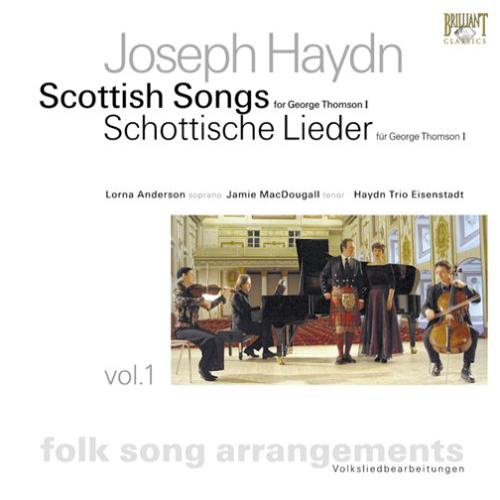Dip Your Ears, No. 53 (Haydn's Scottish Songs)
  J.Haydn, Scottish Songs, v.1, L.Anderson, J.MacDougall, Haydn Trio Eisenstadt Brilliant 92278     | At barn or byre thou shalt na drudge, |
But what about a slew of choral music—enough music to fill some ten hours with Brahms. More music, still, comes from Brahms’s own transcriptions of his music for two pianos or piano, four hands. Similarly, Mendelssohn’s secular and sacred choral music would fill a dozen or so CDs. Schubert’s songs for unaccompanied male voices? Another four hours for those who have exhausted his 600+ songs.
But there is a whole other world of obscure compositions: arrangements of Scottish folk songs. I had long stayed away from Beethoven’s such works (a substantial 7-disc collection in a DG Collectors Edition box), thinking that it is likely second-rate and derivative stuff… more a filler for his own pockets than a filler for the chronicles of great music. Now I have read about, and immediately purchased, the first volume of Joseph Haydn’s Schottische Lieder. George Thomson was one of three independent Scottish publishers who, between themselves, commissioned well over a thousand such folksong arrangements.
Their choice of composers was rather sophisticated, too: Beethoven and Haydn, Hummel and Weber, as well as the nowadays less luminary Pleyel and Kozeluch – then still referred to as “the three (together with Haydn) greatest luminaries of modern music.” Haydn apparently delighted in the commission—he delivered over 400 (!) arrangements. If we didn’t know from the correspondence that he enjoyed the work, we’d know from listening to them. Goodness, what little marvels they are. Songs with piano trio accompaniment, they are rich in ideas, infectiously melodious; in short: a light delight. Some of the songs—given their material—have a tad ‘sameness’ about them – and after listening to the super-budget-priced CD that makes up volume 1 of a series that will hopefully go beyond volume 2 (an equally inexpensive 4-CD set) you will have a pretty good idea of what melodic turns make a song ‘Scottish’. That is not to say that they will become boring to you because for their sheer beauty they can’t be had enough of. For now I hit ‘shuffle’ on my CD player to listen to them in a new order, but next week I’ll get the second volume. That split, by the way, is ingenious. For $7 you can get a ‘sampler’, without duplicating any of the songs you get in the more substantial set (at $22 no luxury acquisition, either). That arrangement is something to copy for other companies that offer large sets of lesser-known works.
Singing are the native Scots Lorna Anderson (soprano) and Jamie MacDougall (tenor), wonderful voices and the necessary idiomatic advantage—particularly when it comes to singing in the Scottish dialect. The Haydn Trio Eisenstadt gets into the spirit with them.























































1 comment:
But sair I fear some happier swain,
Has gain'd sweet Jeanie's favour.
If so, may every bliss be hers,
Though I maun never have her!
But gang she east, or gang she west,
'Twixt Forth and Tweed all over,
While men have eyes, or ears, or taste,
She'll always find a lover.
Post a Comment